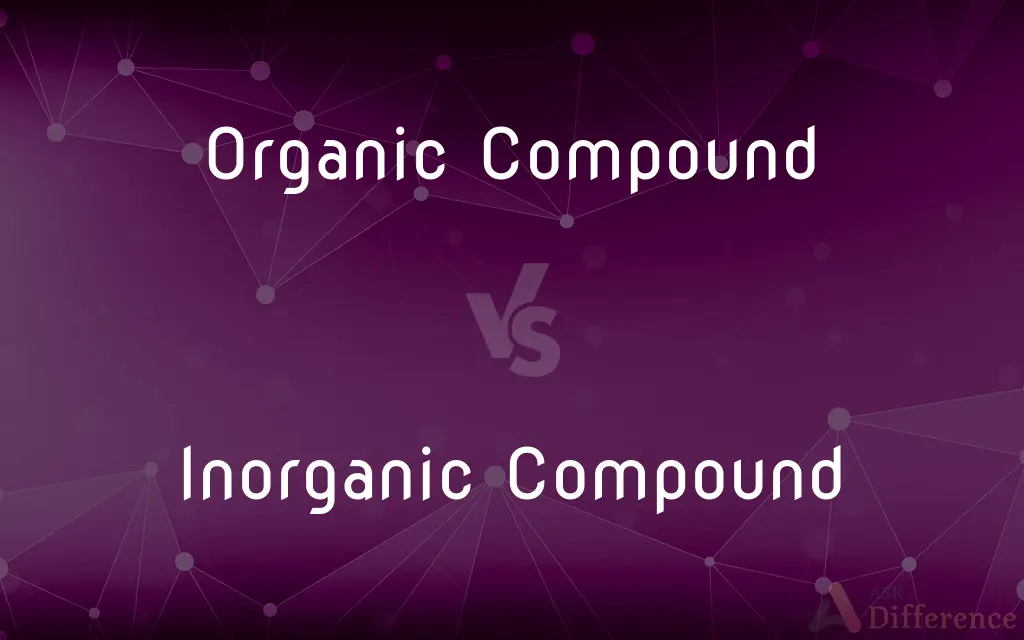Organic Compound vs. Inorganic Compound — What's the Difference?
By Urooj Arif & Fiza Rafique — Published on March 9, 2024
Organic compounds are based on carbon-hydrogen bonds, involved in living systems, while inorganic compounds lack these bonds and are broader in application.

Difference Between Organic Compound and Inorganic Compound
Table of Contents
ADVERTISEMENT
Key Differences
Organic compounds are characterized by their basis in carbon-hydrogen bonds, making them fundamental to life's chemical processes. They include a vast array of substances such as fuels, plastics, and DNA. On the other hand, inorganic compounds do not center around carbon-hydrogen bonds. They encompass a wider variety of substances, including metals, salts, and minerals, which play crucial roles in various industrial and environmental processes.
Organic chemistry focuses on compounds that are derived from living organisms or are capable of forming life. These compounds are often complex and have unique properties that allow for the creation of a wide range of materials, from pharmaceuticals to polymers. Whereas, inorganic chemistry deals with compounds that originate from non-living sources, featuring simpler structures and a diversity that spans across elements from the entire periodic table, facilitating applications in areas like catalysis, materials science, and electronics.
The solubility of organic compounds is primarily in organic solvents due to their non-polar nature, enabling their use in a variety of chemical reactions and processes specific to organic chemistry. In contrast, inorganic compounds are generally soluble in water, attributing to their ionic or polar nature, which is essential for applications in aqueous solutions, such as water treatment and metal extraction.
The thermal stability of organic compounds varies widely, with many decomposing upon heating, a property exploited in processes like combustion and pyrolysis. Inorganic compounds, however, often exhibit higher thermal stability, making them suitable for use in high-temperature processes and materials, such as ceramics and refractory materials.
Organic compounds are essential for biological processes, serving as the building blocks of life, including proteins, carbohydrates, and nucleic acids. In contrast, inorganic compounds, while not forming the basis of life, are indispensable in biological systems for functions such as oxygen transport (hemoglobin) and photosynthesis (chlorophyll), highlighting the interplay between organic and inorganic chemistry in life.
ADVERTISEMENT
Comparison Chart
Basis of Composition
Carbon-hydrogen bonds essential
No carbon-hydrogen bond requirement
Source
Derived from living organisms or their products
Derived from non-living sources
Complexity
Generally complex structures
Simpler structures
Solubility
Soluble in organic solvents
Soluble in water
Thermal Stability
Varies, many decompose upon heating
Generally higher thermal stability
Role in Biological Systems
Fundamental to life's chemical processes
Indispensable for specific biological functions
Compare with Definitions
Organic Compound
Can decompose upon heating.
Glucose decomposes when heated, undergoing caramelization.
Inorganic Compound
Includes metals, minerals, and salts.
Quartz, composed of silicon and oxygen, is an inorganic compound.
Organic Compound
The basis of life's molecular diversity.
DNA, a complex organic compound, carries genetic information.
Inorganic Compound
Often exhibits higher thermal stability.
Silicon carbide is used in high-temperature applications.
Organic Compound
Found in all known forms of life.
Proteins, organic compounds, are vital for bodily functions.
Inorganic Compound
Generally soluble in water.
Potassium nitrate dissolves in water, used in fertilizers.
Organic Compound
Soluble in organic solvents.
Benzene, an organic solvent, dissolves many organic compounds.
Inorganic Compound
A chemical compound that is not based on carbon-hydrogen bonds.
Salt (NaCl) is a common inorganic compound.
Organic Compound
A chemical compound containing carbon-hydrogen bonds.
Methane (CH4) is the simplest organic compound.
Inorganic Compound
Plays roles in biological systems.
Hemoglobin, though a protein, contains an inorganic iron ion.
Common Curiosities
What defines an organic compound?
Organic compounds are primarily based on carbon-hydrogen bonds.
Can inorganic compounds contain carbon?
Yes, some inorganic compounds contain carbon but lack carbon-hydrogen bonds, e.g., carbonates.
Are all organic compounds derived from living organisms?
While historically thought, many organic compounds can now be synthesized in labs.
What is a common use of inorganic compounds?
Inorganic compounds are widely used in industries, such as in fertilizers, metals, and ceramics.
How do organic and inorganic compounds differ in solubility?
Organic compounds are usually soluble in organic solvents, whereas inorganic compounds are generally soluble in water.
What role do organic compounds play in technology?
Organic compounds are crucial in pharmaceuticals, plastics, and organic electronics.
How do organic solvents differ from inorganic solvents?
Organic solvents are carbon-based and dissolve organic compounds, whereas inorganic solvents, like water, dissolve inorganic compounds.
Why are some organic compounds volatile?
Their molecular structures lead to lower boiling points, making them easily vaporizable.
Can both organic and inorganic compounds be toxic?
Yes, toxicity depends on the specific compound and its concentration, not its organic or inorganic nature.
How does the complexity of organic compounds compare to inorganic compounds?
Organic compounds often have complex, varied structures, unlike the simpler structures of inorganic compounds.
What role do organic compounds play in the environment?
They are key to carbon cycling and ecosystem dynamics, including as sources and sinks of carbon.
Do inorganic compounds play a role in environmental processes?
Yes, they are pivotal in processes like water purification and atmospheric chemistry.
Are all inorganic compounds non-flammable?
Many are, due to their stability, but there are exceptions, especially among reactive metals.
What makes organic compounds essential for life?
They are the building blocks of biological molecules, crucial for life processes.
Share Your Discovery

Previous Comparison
Jews vs. Gentiles
Next Comparison
Usted vs. UstedesAuthor Spotlight
Written by
Urooj ArifUrooj is a skilled content writer at Ask Difference, known for her exceptional ability to simplify complex topics into engaging and informative content. With a passion for research and a flair for clear, concise writing, she consistently delivers articles that resonate with our diverse audience.
Co-written by
Fiza RafiqueFiza Rafique is a skilled content writer at AskDifference.com, where she meticulously refines and enhances written pieces. Drawing from her vast editorial expertise, Fiza ensures clarity, accuracy, and precision in every article. Passionate about language, she continually seeks to elevate the quality of content for readers worldwide.
















































